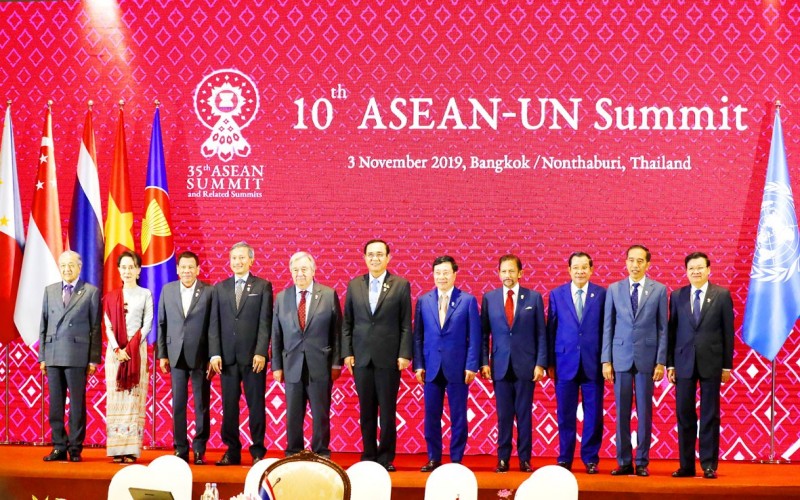《TAIPEI TIMES》 World’s biggest trade deal likely to be delayed

From left, Malaysian Prime Minister Mahathir Mohamad, Burmese State Counselor Aung San Suu Kyi, Philippine President Rodrigo Duterte, Singaporean Minister of Foreign Affairs Vivian Balakrishnan, UN Secretary-General Antonio Guterres, Thai Prime Minister Prayuth Chan-ocha, Vietnamese Prime Minister Nguyen Xuan Phuc, Brunei Sultan Hassanal Bolkiah, Cambodian Prime Minister Hun Sen, Indonesian President Joko Widodo and Laotian Prime Minister Thongloun Sisoulith yesterday pose for a group photograph at IMPACT Muang Thong Thani in Nonthaburi Province, Thailand. Photo: EPA-EFE
/ AFP, BANGKOK
The signing of the world’s largest trade pact is likely to be postponed until next year, according to a draft statement by Southeast Asian leaders, delaying a deal craved by China as it seeks to temper the fallout from a painful tariff dispute with the US.
The 16-nation Regional Comprehensive Economic Partnership (RCEP) spans from India to New Zealand and includes 30 percent of global GDP and half of the world’s people.
Objections by India have dampened hopes that the pact would be finalized at the ASEAN summit in Bangkok, where members of the 10-nation bloc have been joined by the prime ministers of India and China. The summit ends today.
“Most market access negotiations have been completed and the few outstanding bilateral issues will be resolved by Feb 2020,” said a draft agreement obtained by reporters.
Negotiations have sputtered for several years, but the statement said the text of all 20 chapters was now complete “pending the resolution of one” member, believed to be India.
However, it said all members were “committed to sign the RCEP” next year in Vietnam, which is to take over the ASEAN chair.
New Delhi is worried that its small businesses would be hard hit by any flood of cheap Chinese goods.
Indian Prime Minister Narendra Modi yesterday repeated his country’s concerns during talks with ASEAN leaders.
Modi said that India’s unresolved issues include “meaningful market access for all parties,” said a diplomat who attended the meeting, speaking on condition of anonymity.
Beijing sees RCEP as a central pillar of its trade strategy for its Asian neighborhood, and it is backed by the leaders of ASEAN, who represent a 650 million-strong market.
The RCEP — which includes the 10-nation ASEAN bloc, along with China, India, Japan, South Korea, Australia and New Zealand — accounts for 40 percent of global commerce.
The tariffs lobbed by the US and China on billions of dollars worth of each others’ goods could drag growth to the lowest rate in more than a decade, the IMF has said.
That has spooked Asia-Pacific economies and — with the exception of India — sharpened the focus on getting the RCEP deal done.
“In just the past two years new protectionism measures have affected nearly US$1 trillion of world trade,” New Zealand Prime Minister Jacinda Ardern told a business meeting on the sidelines of the ASEAN summit. “We’ve been a strong proponent for concluding a high quality RCEP as soon as possible.”
Chinese Premier Li Keqiang (李克強) said earlier in the day that his country remained “firmly committed to supporting ASEAN centrality” as part of its regional ties.
He is expected to drive the case for RCEP when member states meet this afternoon.
Li also professed Beijing’s readiness “to work” with ASEAN states on a code of conduct in the contested South China Sea.
Li said that the first reading of the code was “a very important landmark,” and committed to a timeline to settle on the wording of the agreement by 2021.
Philippine President Rodrigo Duterte welcomed the progress of the code, but said that more needed to be done.
“Let us get this job done sooner than later, as we are given the assurance of tranquility of the area,” he said.
新聞來源:TAIPEI TIMES

















